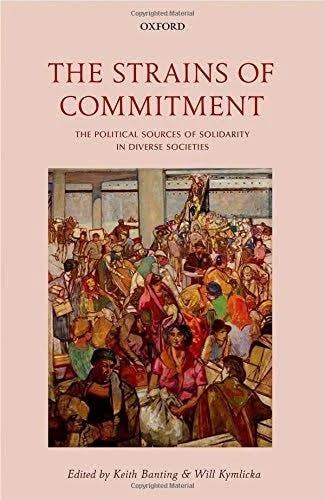The Strains of Commitment: The Political Sources of Solidarity in Diverse Societies
Is multicultural diversity a threat to social solidarity, and, if so, would multicultural diversity weaken the redistributive policies of the welfare state? These are the questions that this excellent edited volume addresses head-on. As such, it is highly relevant and much-needed both politically, as well as academically… a serious and—rare—joint reading of both normative and positive-empirical research on different models of community boundaries and solidarity.
Silja Hausermann in European Journal of Sociology
Building and sustaining solidarity is a compelling challenge, especially in ethnically and religiously diverse societies. Recent research has concentrated on forces that trigger backlash and exclusion. The Strains of Commitment examines the politics of diversity in the opposite direction, exploring the potential sources of support for an inclusive solidarity, in particular political sources of solidarity. The volume asks three questions: Is solidarity really necessary for successful modern societies? Is diversity really a threat to solidarity? And what types of political communities, political agents, and political institutions and policies help sustain solidarity in contexts of diversity? To answer these questions, the volume brings together leading scholars in both normative political theory and empirical social science. Drawing on in-depth case studies, historical and comparative research, and quantitative cross-national studies, the research suggests that solidarity does not emerge spontaneously or naturally from economic and social processes but is inherently built or eroded though political action. The politics that builds inclusive solidarity may be conflicting in the first instance, but the resulting solidarity is sustained over time when it becomes incorporated into collective (typically national) identities and narratives, when it is reinforced on a recurring basis by political agents, and - most importantly - when it becomes embedded in political institutions and policy regimes. While some of the traditional political sources of solidarity are being challenged or weakened in an era of increased globalization and mobility, the authors explore the potential for new political narratives, coalitions, and policy regimes to sustain inclusive solidarity.
the book provides an impressively lucid account of one of the most pressing contemporary societal issues. Thereby, its main originality lies not only in building a bridge between theories of multiculturalism and justice, but also in the exemplary articulation of political theory and empirical social science when investigating both.
Christoph Niessen in Regional & Federal Studies
Table of Contents
-
Introduction
- Introduction: The Political Sources of Solidarity in Diverse Societies, Keith Banting and Will Kymlicka
-
Section One: The Political Theory of Solidarity
- Solidarity and its Sources, David Miller
- Citizenship and Collective Identities as Political Sources of Solidarity in the European Union, Rainer Baubock
- Against Fraternity: Democracy without Solidarity, Jacob T. Levy
-
Section Two: Public Attitudes on Diversity and Solidarity
- Tension Between the Elites and the Masses in Germany, Celine Teney and Marc Helbling
- Diversity and Solidarity: New Evidence from Canada and the US, Richard Johnston, Matthew Wright, Stuart Soroka, and Jack Citrin
- Conceptions of Citizenship and Tolerance Towards Immigrants: A Comparative Study of Public Opinion Data, Tim Reeskens and Wim van Oorschot
-
Section Three: The Politics of Diversity and Solidarity
- The Political Sources of Social Solidarity, Peter A. Hall
- The Electoral Politics of Solidarity: The Welfare Agendas of Radical Right Parties, Zoe Lefkofridi and Elie Michel
- Making Xenophobia Matter: The Consequences of the 2002 Elections for Immigration Politics in the Netherlands, Edward Koning
- Solidarity, Diversity, and the Quality of Government, Bo Rothstein
- Solidarity and Conflict: Understanding the Causes and Consequences of Access to Citizenship, Civic Integration Policies, and Multiculturalism, Irene Bloemraad
- Diversity and Solidarity in Denmark and Sweden, Karin Borevi
- Belgium: A Hard Case for Liberal Nationalism?, Patrick Loobuyck and Dave Sinardet
-
Section Four: Concluding Commentary
- Concluding Reflections: Solidarity, Diversity, and Social Justice, Philippe Van Parijs
